Intel Xeon Silver 4208 Benchmarks
For this exercise, we are using our legacy Linux-Bench scripts which help us see cross-platform “least common denominator” results we have been using for years as well as several results from our updated Linux-Bench2 scripts. Starting with our 2nd Generation Intel Xeon Scalable benchmarks, we are adding a number of our workload testing features to the mix as the next evolution of our platform.
At this point, our benchmarking sessions take days to run and we are generating well over a thousand data points. We are also running workloads for software companies that want to see how their software works on the latest hardware. As a result, this is a small sample of the data we are collecting and can share publicly. Our position is always that we are happy to provide some free data but we also have services to let companies run their own workloads in our lab, such as with our DemoEval service. What we do provide is an extremely controlled environment where we know every step is exactly the same and each run is done in a real-world data center, not a test bench.
We are going to show off a few results, and highlight a number of interesting data points in this article.
Python Linux 4.4.2 Kernel Compile Benchmark
This is one of the most requested benchmarks for STH over the past few years. The task was simple, we have a standard configuration file, the Linux 4.4.2 kernel from kernel.org, and make the standard auto-generated configuration utilizing every thread in the system. We are expressing results in terms of compiles per hour to make the results easier to read:
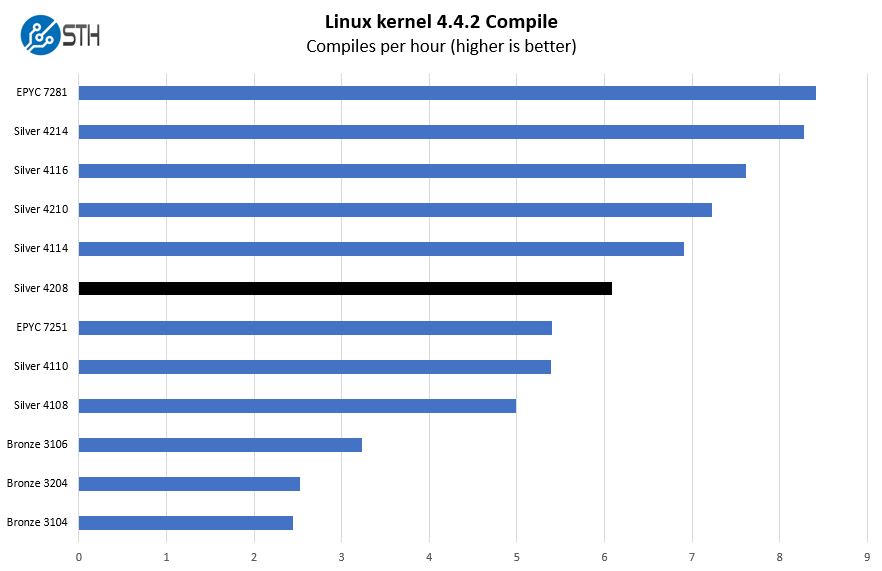
Here we saw performance above that of the Intel Xeon Silver 4110. This was surprising at first, however, the Intel Xeon Silver 4208 has higher single core turbo speeds at 3.2GHz and seems to be holding clock speeds higher than our Silver 4110 was on average. Even without adding cores, increasing clock speeds has had an impact on this segment.
c-ray 1.1 Performance
We have been using c-ray for our performance testing for years now. It is a ray tracing benchmark that is extremely popular to show differences in processors under multi-threaded workloads. We are going to use our 8K results which work well at this end of the performance spectrum.
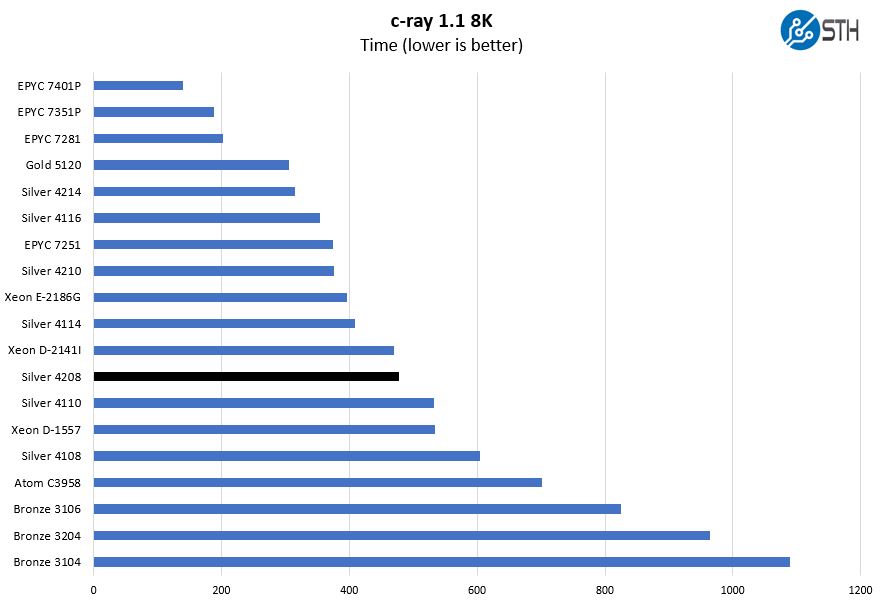
Here we see a similar, however slightly more muted version of the generational performance gain over the Intel Xeon Silver 4108 processor.
7-zip Compression Performance
7-zip is a widely used compression/ decompression program that works cross-platform. We started using the program during our early days with Windows testing. It is now part of Linux-Bench.
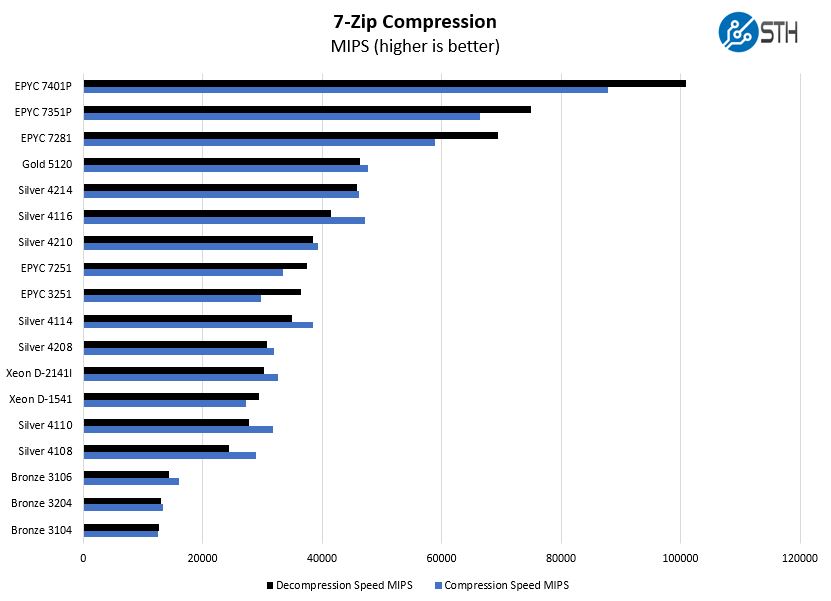
Even with the clock speed boost, in this test, the AMD EPYC 7251 performed notably better. One gets more I/O with the AMD EPYC 7251 but also has to account for quadrupling the number of NUMA nodes in the server and a higher TDP.
NAMD Performance
NAMD is a molecular modeling benchmark developed by the Theoretical and Computational Biophysics Group in the Beckman Institute for Advanced Science and Technology at the University of Illinois at Urbana-Champaign. More information on the benchmark can be found here. With GROMACS we have been working hard to support Intel’s Skylake AVX-512 and AVX2 supporting AMD Zen architecture. Here are the comparison results for the legacy data set:
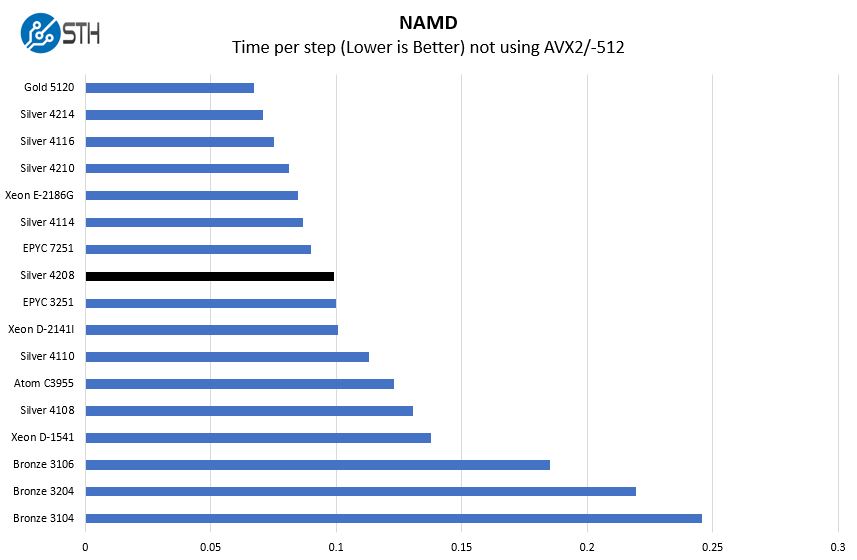
Here the performance is very similar to the AMD EPYC 3251 embedded SoC. That chip is a single NUMA node design with a lower TDP, but it also has less I/O than the Intel Xeon Silver 4208.
Sysbench CPU test
Sysbench is another one of those widely used Linux benchmarks. We specifically are using the CPU test, not the OLTP test that we use for some storage testing.
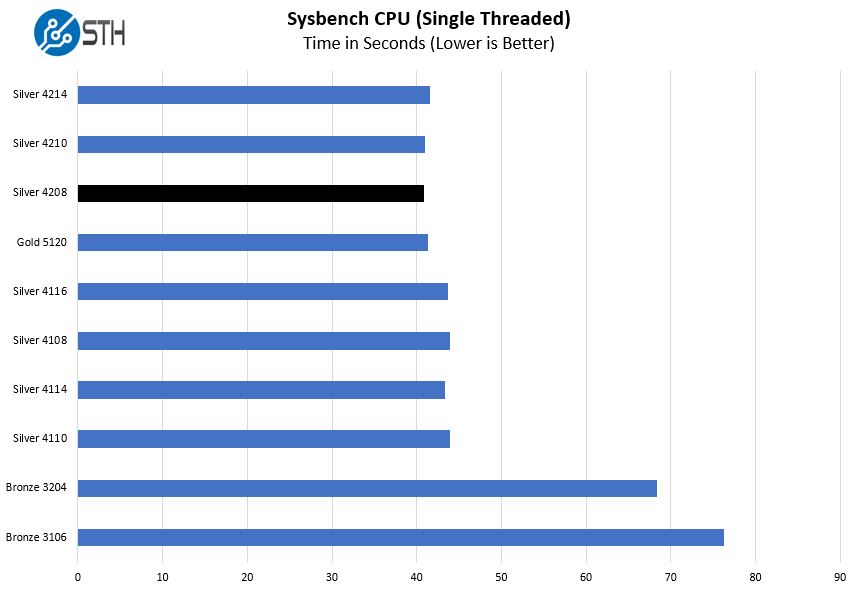
One point of note here is that the single thread clock speed of 3.2GHz is higher than the 3.0GHz limit of the previous Intel Xeon Silver generation, even the Silver 4116. That leads to a small step pattern here.
OpenSSL Performance
OpenSSL is widely used to secure communications between servers. This is an important protocol in many server stacks. We first look at our sign tests:
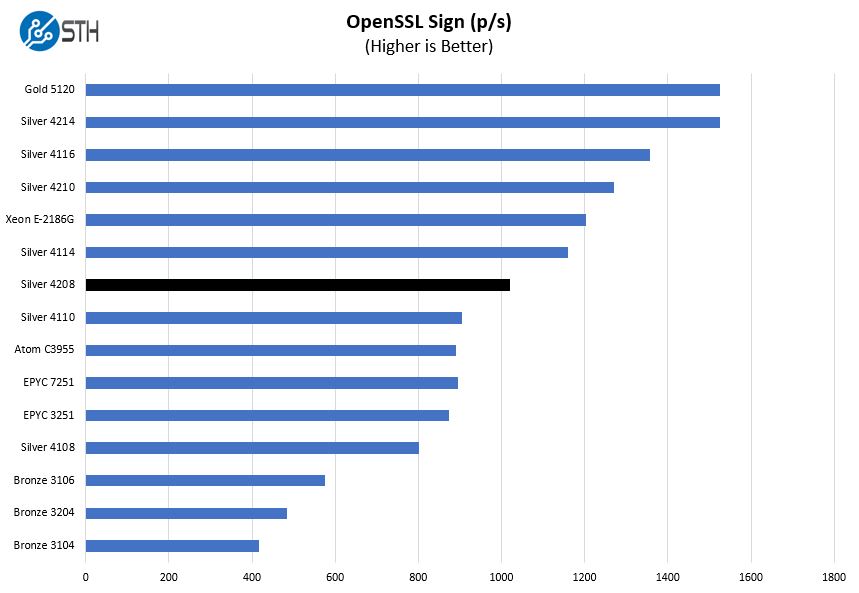
Here are the verify results:
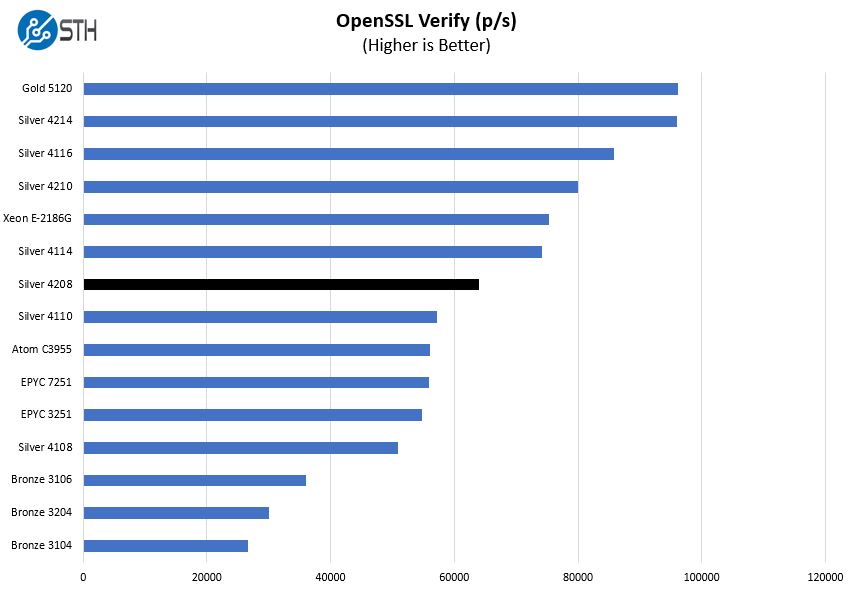
Here the higher-clocked Intel Xeon E-2186G performs well despite fewer cores. Clock speed still matters.
UnixBench Dhrystone 2 and Whetstone Benchmarks
Some of the longest-running tests at STH are the venerable UnixBench 5.1.3 Dhrystone 2 and Whetstone results. They are certainly aging, however, we constantly get requests for them, and many angry notes when we leave them out. UnixBench is widely used so we are including it in this data set. Here are the Dhrystone 2 results:
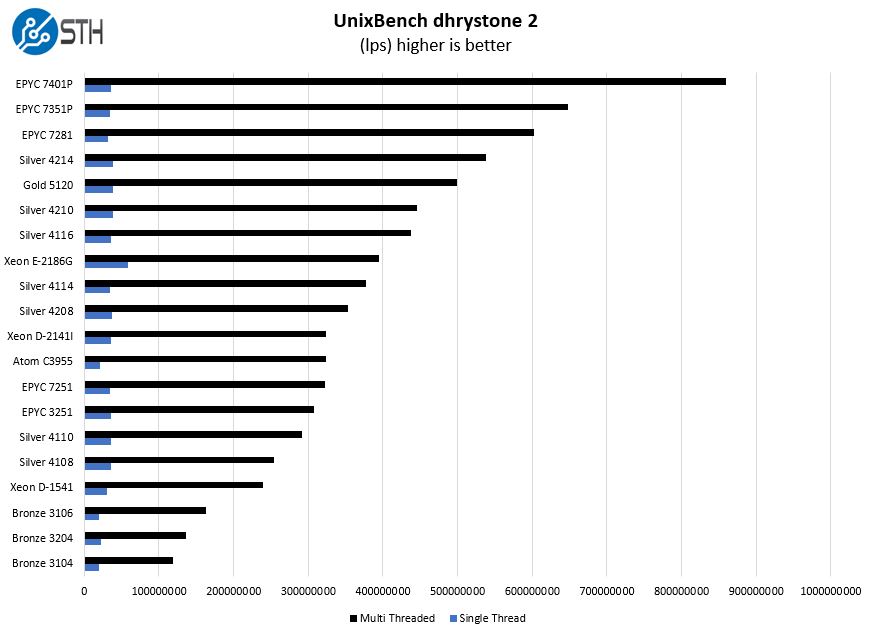
Here are the whetstone results:
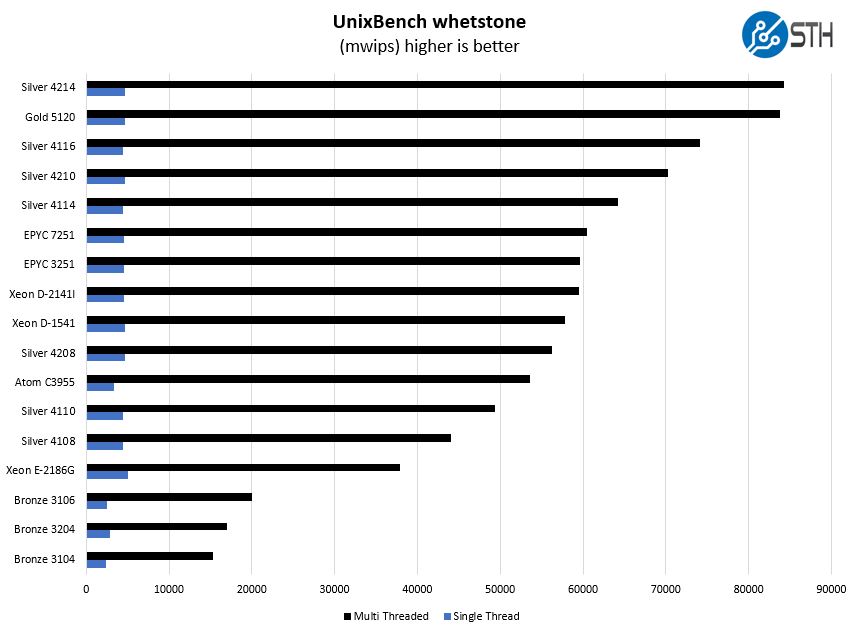
We wanted to take a moment here to draw attention to the Intel Xeon Bronze 3204 CPU. Without a Xeon Bronze 3206 in this generation, the Bronze 3204 is one step below the Intel Xeon Silver 4208 on the SKU stack. With two more cores, almost three times as many threads due to hyper-threading, and higher clock speeds, the Intel Xeon Silver 4208 is perhaps the biggest performance upgrade for the least cost in the entire SKU stack.
GROMACS STH Medium AVX2/ AVX-512 Enabled
We have a small GROMACS molecule simulation we previewed in the first AMD EPYC 7601 Linux benchmarks piece. In Linux-Bench2 we are using our “small” case which is appropriate for single-socket servers. Our GROMACS test will use the AVX-512 and AVX2 extensions if available.
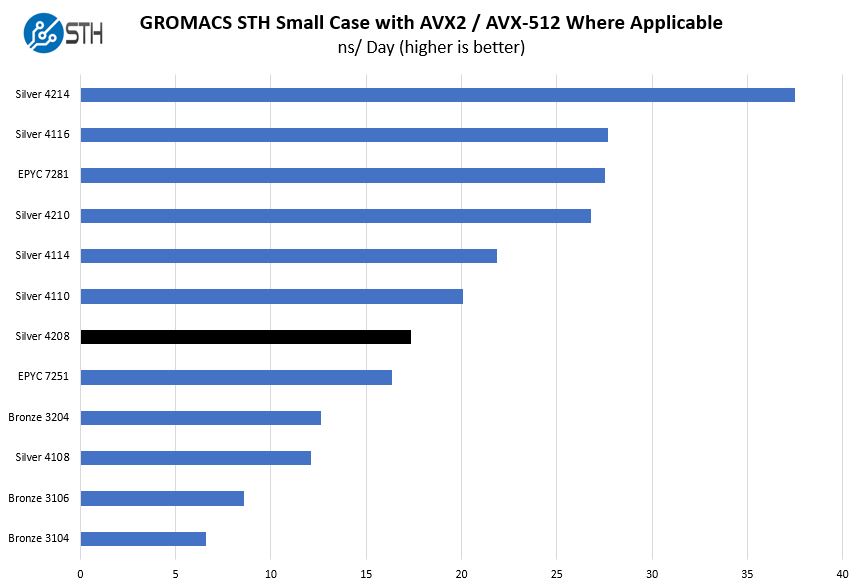
Here we can see a solid performance gain. AVX-512 clocks are much higher in this generation from what we are seeing in the silver line of our results.
Chess Benchmarking
Chess is an interesting use case since it has almost unlimited complexity. Over the years, we have received a number of requests to bring back chess benchmarking. We have been profiling systems and now use the results in our mainstream reviews:
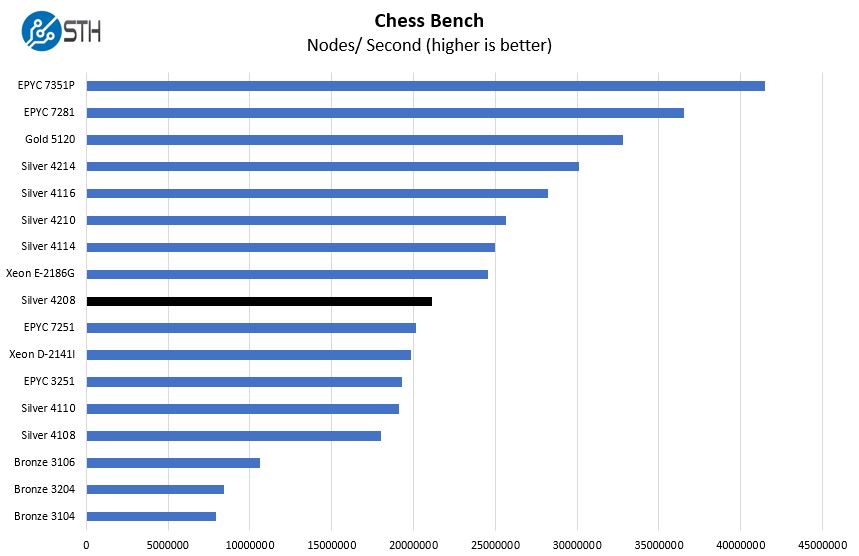
This is one of the closest Xeon Silver 4208 to Silver 4108 benchmarks, but there is still an appreciable uplift in performance, even over the Silver 4110 due to clock speed increases.
Next, we are going to discuss market positioning before our final words.




Using Firefox. about 1/2 way down the article when reading, (especially page 3), floating add on the left block the text making the text not readable.
Same issue as above, also Firefox… what is probably the left sidebar content (a couple ads and the newsletter signup block) pop over the article content as soon as the header scrolls up.
Same issue in Chrome on page 3.
And same issue even with IE11, also on page 3.
Hi guys. Thanks for reporting this. Small bug. It should be fixed now.
Same issue here using IE6.